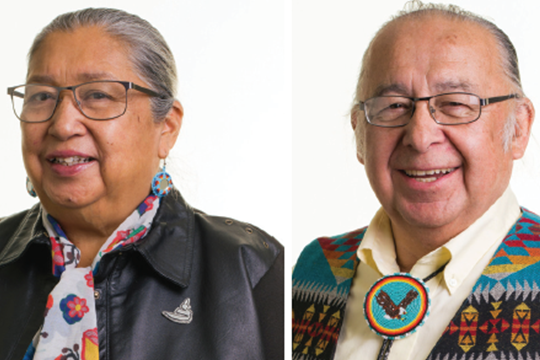
Photo: Aaron Cohen/Canadian Museum for Human Rights
Like many retirees, Barbara and Clarence Nepinak find themselves even busier now than when they were still working full-time.
The couple, both members of Pine Creek First Nation, sit on a number of different boards and advisory councils for community organizations such as the Manitoba Association of Native Languages, the Standing Indigenous Advisory Council to the Canadian Museum for Human Rights, the Vancouver-based Healthy Aboriginal Network, the Elders Advisory Council at the University of Winnipeg, and the federal Climate Change Adaptation Program, which encourages Aboriginal and northern communities to take the lead in assessing and developing strategies that combat the impact of climate change.
They have also helped spearhead a number of projects to promote and preserve Indigenous culture in Canada as well as in countries as far away as Brazil, Taiwan, Malaysia, Australia, New Zealand, and Chile. So while they may be retired, they are rarely ever bored. “Yeah, it’s fair to say that,” says Barbara with a laugh during a rare quiet moment at the couple’s Winnipeg home.
On July 18, the couple were among 12 Manitobans presented with the Order of Manitoba, the province’s highest honour. It recognizes people who have demonstrated excellence and achievement in enriching the social, cultural, and economic fabric of the province.
Barbara and Clarence both enjoyed lengthy careers in the federal public service prior to retiring. Barbara worked primarily in human resources for a number of federal government departments, including Transport Canada, for 35 years until she retired 13 years ago. Clarence was a program manager for Health Canada for 27 years until he retired 10 years ago.
Both say their careers with the federal public service influenced them to give back to the community. Clarence saw the needs of Indigenous people while travelling to numerous First Nations communities across the province for work. Barbara, meanwhile, witnessed first-hand the struggles of many Indigenous people entering the workforce and became a fierce advocate for employment equity.
One of their proudest achievements is the work they did through the Seven Oaks School Division to teach young people the Ojibwa language as part of the division’s Indigenous Language Program. “It was so gratifying when you saw how happy the kids were that they were able to say even a few words in Ojibwa,” says Barbara, adding at public events former students often approach her and Clarence to thank them for the opportunity.
Barbara has served as an elder and cultural adviser on many advisory councils and boards. In addition to her work at the human rights museum, she serves on The Forks Foundation Board and the national board for the Cultural Human Resources Council in Ottawa.
Clarence serves on a number of local boards and committees including the board of the St. James Historical Society. He also helped develop an oral history walking tour of The Forks, which the couple conduct throughout the summer, and sometimes attracting crowds of more than 70 people. “It’s almost overwhelming,” he says of the response to the popular tour.
The Nepinaks are well-known to many visitors to The Forks, one of Winnipeg’s most popular and historic meeting places. For the past 20 winters, they have set up a teepee in the area and invited people in to share a warm fire and some homemade bannock. Two decades later, they are now being visited by the children and grandchildren of their first guests.
As much as they already have on the go, don’t expect the couple to slow down any time soon. Both say they get far more out of their volunteer efforts than they put into them. “When people call us we always make an effort to try and help meet their needs,” says Barbara. “We just want to go out there and help people as much as we can.”

